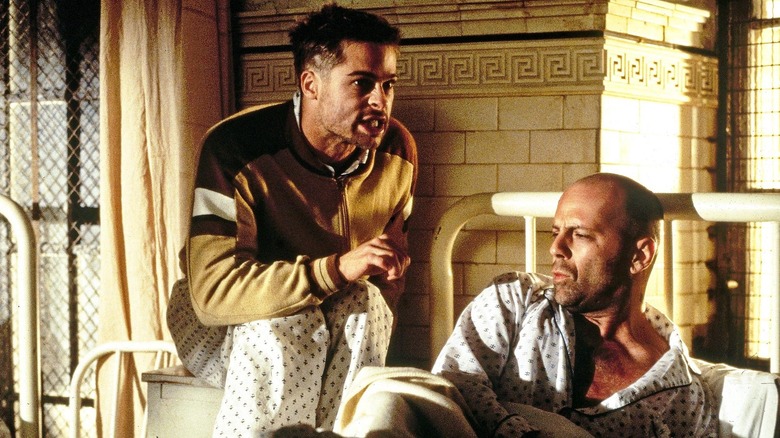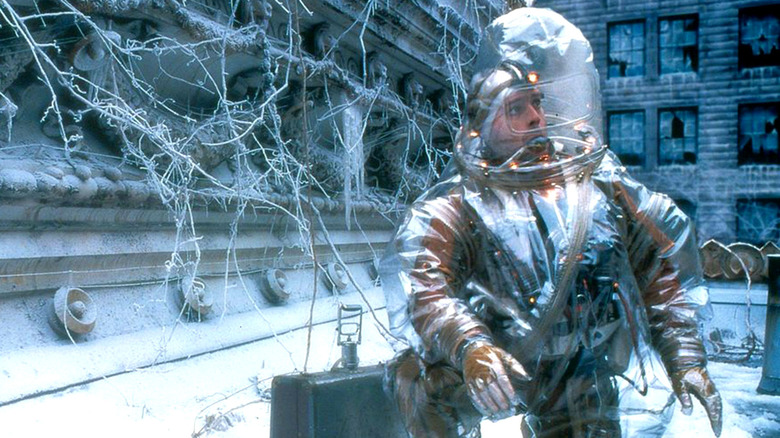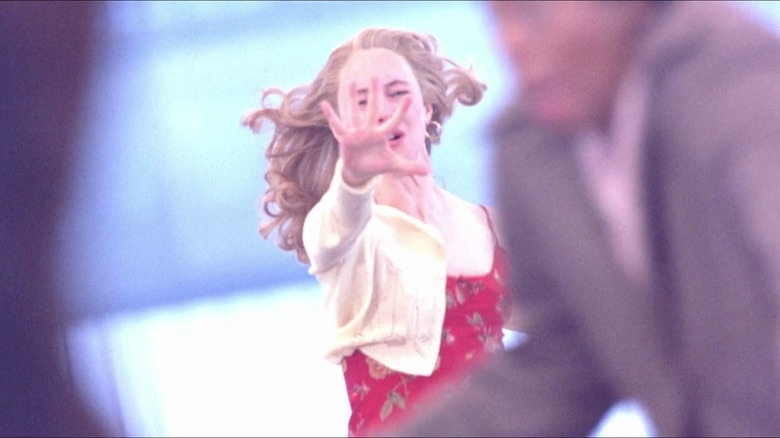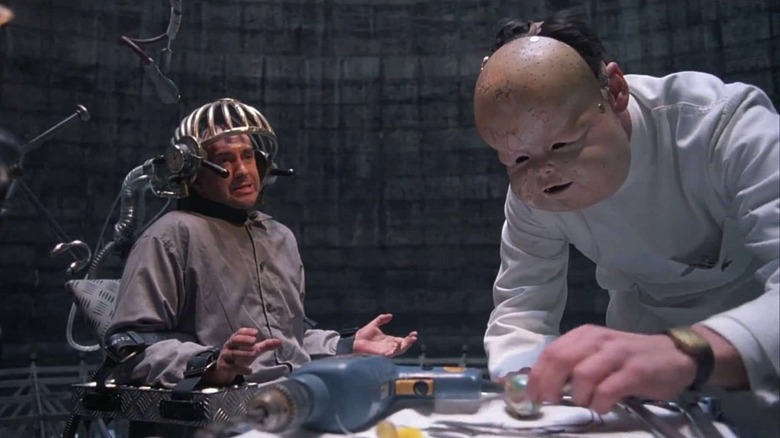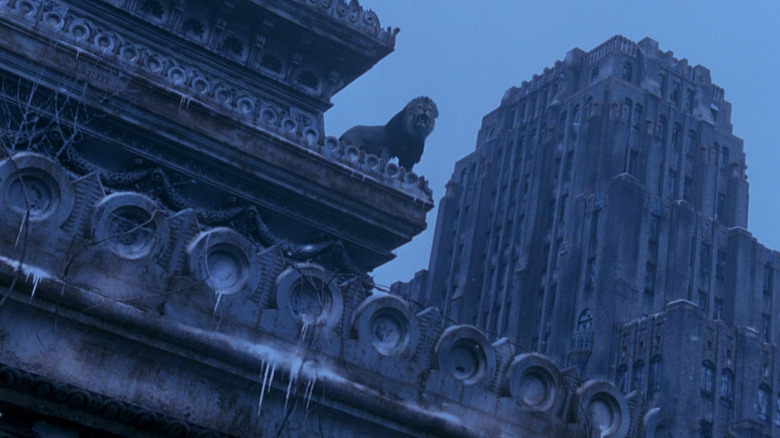How Terry Gilliam's 12 Monkeys Vision Was Saved By The Film's Cast
Hollywood has a long history of remaking European movies, with mixed results. For every "Vanilla Sky" or "The Talented Mr. Ripley", there is a "City of Angels" or (pass the barf bag) "Blame it on Rio." At first glance, Chris Marker's remarkable experimental contemplation of time and memory, "La Jetee," doesn't look like the kind of thing that would translate into a box office hit starring Bruce Willis and Brad Pitt, yet it was the inspiration for Terry Gilliam's "12 Monkeys."
Clocking in at just 28 minutes, the film is a sequence of enigmatic black-and-white still images, broken up towards the end by a fleeting few frames of motion where a woman awakes with a haunting look on her face. I first tracked it down shortly after "12 Monkeys" hit the cinemas and didn't really understand what I was looking at; I was thinking, "Why am I sitting here watching a slide show?"
It was only on later viewings that I appreciated it for the masterpiece it is. Unlike a conventional motion picture, the hypnotic rhythm of the editing and immersive sound design creates a sandbox for your senses, with each stark photo inviting your imagination to fill in the gaps. Survivors in post-WWIII Paris are sending test subjects into the past and future in the desperate hope of rescuing the present. Our unknown protagonist, anchored to his pre-war life by a disturbing memory, travels back in time looking for clues and falls in love. At the end of the film, we discover that he witnessed his own death when he was a child.
That's about as good a hook as they come, and with his feature adaptation "12 Monkeys," Gilliam was also armed with final cut, an excellent screenplay, and a top-notch cast. Yet 10 years after the director clashed with Universal over "Brazil," the film widely regarded as his masterpiece, the studio was once again spooked by the finished product.
So what happens in 12 Monkeys again?
The year is 2035, and the survivors of a deadly virus that wiped out most of mankind eke out a grim subterranean existence. Scientists are using clunky old tech to send "volunteers" back to the past to investigate the source of the virus, in the hope of changing the course of history and saving billions of lives. Their prime suspect for the pandemic is a shadowy group known as the Army of the Twelve Monkeys.
One volunteer is James Cole (Willis), a prisoner troubled by childhood memories of witnessing a man shot dead at an airport. He is sent back to 1996, the year of the outbreak, to search for clues. Unfortunately, their time machine is a bit wonky and he overshoots, landing in 1990 instead. He's arrested and thrown into a mental institute, awaiting evaluation by Dr. Kathryn Railly (Madeleine Stowe). While on the ward, he also meets Jeffrey Goines (Pitt), a disturbed young man with wild anti-consumerist theories.
Yanked back to 2035, Cole is told that Goines had connections with the Army of the Twelve Monkeys. Were this small group of radicals really responsible for the apocalyptic plague? Cole is sent back to the correct year this time, and kidnaps Dr. Railly to help him find out.
"12 Monkeys" is one of Gilliam's strongest films coming off the back of my favorite of his, "The Fisher King." While the latter was supposedly the director's nice little personal project to get over the disaster of "The Adventures of Baron Munchausen," "12 Monkeys" was Gilliam working on a big commercial package with A-list stars. It's fascinating to see the similarities between the two films, both pre-occupied with trauma, mental illness, and a distorted view of reality. Gilliam emphasizes the uncertainty and paranoia with dutch angles, grotesque fish-eye lenses, and looming faces shot from low angles. While "The Fisher King" is warm and heartfelt, "12 Monkeys" is murky, dense, and makes you work for its rewards. Gilliam may have only been a gun-for-hire, but he plasters his unique style all over it.
Studio trouble and The Hamster Factor
During the "12 Monkeys" shoot, young filmmakers Keith Fulton and Louis Pepe were invited to make a behind-the-scenes documentary, resulting in the feature-length project "The Hamster Factor and Other Tales of Twelve Monkeys." In an early scene, Gilliam half-jokingly says they are there as witnesses in case anything goes wrong again, and they followed the production right up to the end.
Gilliam sounds very cynical during the film and is openly contemptuous of the studio system. It is perhaps understandable after his troubles with Universal on "Brazil," the studio dumping "Munchausen" thanks to its ballooning budget and perceived lack of appeal to a mass market, and a string of unrealized projects in the early '90s. Before he signed on for "12 Monkeys," Gilliam's adaptations of "A Connecticut Yankee in King Arthur's Court" and "A Tale of Two Cities" both fell through due to financing and casting issues. Talking about "12 Monkeys," Gilliam said (via "The Hamster Factor"):
There's a side of me that's just permanently sick to my stomach, feeling I'm being dragged into the abyss of success... on the other hand, there's a side of me that thinks, maybe I'm getting away with murder within the system, maybe I am making a European art movie within the Hollywood system... maybe, I don't know. Maybe I'll just be caught.
The title of the documentary refers to Gilliam's habit of getting hung up on tiny details that others might consider insignificant. For example, there's a shot of Willis, sitting naked in a lab drawing blood with a syringe. Easily overlooked in the foreground is a hamster in a wheel, although Gilliam wasn't happy with the shot until the hamster got busy and started doing a little exercise on cue.
Despite Gilliam's eccentricities and trying to make a complicated time-travel movie on a relatively tight budget of $29 million (by comparison from 1995, "Outbreak" cost $50 million, "Waterworld" a whopping $175 million), filming "12 Monkeys" went quite smoothly. Then the film went out to test audiences, and Gilliam must have feared another "Battle of Brazil."
The battle for Brazil
With "Brazil," Gilliam created a twisted and darkly funny comic dystopia every bit as frightening and depressingly timeless as George Orwell's "Nineteen Eighty-Four." It is an astonishing vision of a wheezing country staggering along on labyrinthine bureaucracy and heavy industry, with a browbeaten populace exasperated to the point of apathy by a bumbling yet venal government. Every facet of life is wrapped in exhausting amounts of red tape, while the state keeps a close eye on its citizens through its sinister Ministry of Information. The state's invasive control of the country is visually represented by the ugly ductwork that snakes through people's homes and every public space, and dissenters are routinely charged for their own interrogation.
The first hour of "Brazil" is one of my favorite things ever put on film. The way Gilliam and his production team realize this dystopia is truly visionary, and its incredible retro-futuristic design prefigures the on-the-blink tech seen in "12 Monkeys." The final act is the least interesting part of the film, devolving into a headache-inducing cavalcade of chases, shooting, car chases, and explosions. Thankfully, it is rescued by a magnificently bleak ending that horrified studio executives at Universal, who was in charge of distribution the film in the US. Gilliam describes their first reaction at a screening (via Criterion):
"At the end of the film I came in for the last ten minutes, and I went up to the projection booth and I was looking down, and I saw as the lights came up the back of those necks, and I knew we were in big trouble. I mean, every muscle was knotted, every tendon, ligament, was just... GYAARRRGHH! There was hatred written all over the back of those heads."
The people at Universal hated the ending and wanted to change it to something a bit more cheerful. Gilliam refused, but Sid Sheinberg, the Universal Chairman, insisted that the film was re-cut to include a "happy" ending, resulting in the horrible "Love Conquers All" cut.
Gilliam went to war for his vision. He took out an ad in Variety challenging Sheiberg to release his version and held secret screenings for Los Angeles film critics. They voted it their pick for Best Film, Best Director, and Best Screenplay of the year.
Thanks to his determination and refusal to bow to the studio's power, Gilliam won the "Battle of Brazil" and the Universal finally released his cut of the movie.
Gilliam's A-list cast saves his vision
As "12 Monkeys" neared completion, studio execs started worrying about whether it would be too much hard work for a mainstream audience. For test screenings, they picked an appropriate crowd, showing the film near the Georgetown campus in Washington D.C. to attract a young, smart, attentive student audience.
While they reacted positively during the screenings, it was a different story when filling out their test cards afterwards. Many said the film took too long to get them engaged, was too confusing, and that it wasn't clear enough what happened at the end. Fearing another studio edit, Gilliam was lucky enough to have his big stars on his side (via The Ringer):
"I always plan for the big battle at the end... as long as Brad, Madeleine, and Bruce were all together with me, they couldn't touch us. That's the way I approach almost every film: who's going to be in the foxhole with me at the end? And they stuck together with me, and the studio couldn't do anything about it."
Aside for a few minor changes, Gilliam got his cut of "12 Monkeys" to the screen without any unsavory battles. It was a good thing, too. While some people might argue a case for "Fear and Loathing in Las Vegas," many believe "12 Monkeys" to be the director's last great film, not to mention a turning point for the careers of two of its marquee names. Bruce Willis, moving into more challenging roles after his early John McClane days, really showed what he could do as an actor in a quiet, nuanced performance. And whether you love or hate Brad Pitt's performance (I'm somewhere towards the latter), his Oscar-nominated antics were another step towards becoming a major Hollywood star.
"12 Monkeys" and its recent TV show took on a new, chilling relevance with the outbreak of Covid-19. It's such a weird experience watching the film again after the past two years of lockdowns and restrictions, when it now plays less like a dark sci-fi thriller and more like a cautionary tale.
